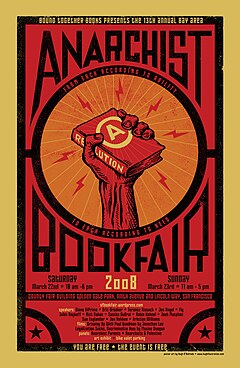Anarchism is a political philosophy and movement that is sceptical of authority and rejects all involuntary, coercive forms of hierarchy. Anarchism calls for the abolition of the state, which it holds to be undesirable, unnecessary, and harmful. It is usually described alongside libertarian Marxism as the libertarian wing of the socialist movement and as having a historical association with anti-capitalism and socialism.

Anarcha-feminism, also referred to as anarchist feminism or feminist anarchism, combines anarchism with feminism. Anarcha-feminism generally posits that patriarchy and traditional gender roles as manifestations of involuntary coercive hierarchy should be replaced by decentralized free association. Anarcha-feminists believe that the struggle against patriarchy is an essential part of class conflict and the anarchist struggle against the state and capitalism. In essence, the philosophy sees anarchist struggle as a necessary component of feminist struggle and vice versa. L. Susan Brown claims that "as anarchism is a political philosophy that opposes all relationships of power, it is inherently feminist".
A permanent autonomous zone (PAZ) is a community that is autonomous from the generally recognized state or authority structure in which it is embedded. PAZs are not controlled by any government.

Infoshops are places in which people can access anarchist or autonomist ideas. They are often stand-alone projects, or can form part of a larger radical bookshop, archive, autonomous social centre or community centre. Typically, infoshops offer flyers, posters, zines, pamphlets and books for sale or donation. Other items such as badges, locally produced artworks and T-shirts are also often available. Infoshops can also provide printing and copying facilities for people to produce their own literature or have a meeting space.
The Alternative Media Project was a non-profit organization that promoted anarchist media.

Red Emma's Bookstore Coffeehouse is a radical infoshop located in Baltimore, Maryland, United States and run by a worker-owner collective. Named for anarchist Emma Goldman, Red Emma's opened in November 2004 and sells fair trade coffee, vegetarian and vegan foods and books. The space also provides free computer access to the Baltimore community, wireless internet and film screenings, political teach-ins, and community events.
Anarchism in the United States began in the mid-19th century and started to grow in influence as it entered the American labor movements, growing an anarcho-communist current as well as gaining notoriety for violent propaganda of the deed and campaigning for diverse social reforms in the early 20th century. By around the start of the 20th century, the heyday of individualist anarchism had passed and anarcho-communism and other social anarchist currents emerged as the dominant anarchist tendency.
"An Anarchist FAQ" is a FAQ written by an international work group of social anarchists connected through the internet. It documents anarchist theory and ideas and argues in favor of social anarchism. It also explores other debates internal to the anarchist movement and counters common arguments against anarchism. It has been in constant evolution since 1995. While it was started as a critique of anarcho-capitalism, by the time it was officially released it had become a general introduction to anarchism.

Self-managed social centres in the United Kingdom can be found in squatted, rented, mortgaged and fully owned buildings. These self-managed social centres differ from community centres in that they are self-organised under anti-authoritarian principles and volunteer-run, without any assistance from the state. The largest number have occurred in London from the 1980s onwards, although projects exist in most cities across the UK, linked in a network. Squatted social centres tend to be quickly evicted and therefore some projects deliberately choose a short-term existence, such as A-Spire in Leeds or the Okasional Café in Manchester. Longer term social centres include the 1 in 12 Club in Bradford, the Cowley Club in Brighton and the Sumac Centre in Nottingham, which are co-operatively owned.
Anarchism in Canada spans a range of anarchist philosophy including anarchist communism, green anarchy, anarcho-syndicalism, individualist anarchism, as well as other lesser known forms. Canadian anarchism has been affected by thought from the United States, Great Britain, and continental Europe, although recent influences include a look at North American indigenism, especially on the West Coast. Anarchists remain a focal point in media coverage of globalization protests in Canada, mainly due to their confrontations with police and destruction of property.
The Spunk Library was an anarchist Internet archive. The name "spunk" was chosen for the term's meaning in Swedish, English, and Australian, summarized by the website as "nondescript, energetic, courageous and attractive".
The following is a list of terms specific to anarchists. Anarchism is a political and social movement which advocates voluntary association in opposition to authoritarianism and hierarchy.
Contemporary anarchism within the history of anarchism is the period of the anarchist movement continuing from the end of World War II and into the present. Since the last third of the 20th century, anarchists have been involved in anti-globalisation, peace, squatter and student protest movements. Anarchists have participated in violent revolutions such as in the Free Territory and Revolutionary Catalonia and anarchist political organizations such as the International Workers' Association and the Industrial Workers of the World exist since the 20th century. Within contemporary anarchism, the anti-capitalism of classical anarchism has remained prominent.
Queer anarchism, or anarcha-queer, is an anarchist school of thought that advocates anarchism and social revolution as a means of queer liberation and abolition of hierarchies such as homophobia, lesbophobia, transmisogyny, biphobia, transphobia, heteronormativity, patriarchy, and the gender binary. People who campaigned for LGBT rights both outside and inside the anarchist and LGBT movements include John Henry Mackay, Adolf Brand and Daniel Guérin. Individualist anarchist Adolf Brand published Der Eigene from 1896 to 1932 in Berlin, the first sustained journal dedicated to gay issues.
The Autonomous Centre of Edinburgh, also known as ACE, is an infoshop and autonomous social centre in Edinburgh, Scotland. It was founded in 1997, although it follows on from previous groups.
121 Centre was a squatted self-managed social centre in Brixton, south London from 1981 until 1999. As an anarchist social centre, the venue hosted a bookshop, cafe, infoshop, library, meeting space, office space, printing facility, and rehearsal space. Organisations using the space included Food Not Bombs, Anarchist Black Cross prisoner aid chapters, an anarcho-feminist magazine, a squatters aid organisation, and an anarchist queer group. Regular events at 121 Centre included punk concerts, a women's cafe night, and a monthly queer night. The centre kept a low profile and was one of the longest-lasting squats in London.
Anarchist archives preserve records from the international anarchist movement in personal and institutional collections around the world. This primary source documentation is made available for researchers to learn directly from movement anarchists, both their ideas and lives.

Anarchist criminology is a school of thought in criminology that draws on influences and insights from anarchist theory and practice. Building on insights from anarchist theorists including Pierre-Joseph Proudhon and Peter Kropotkin, anarchist criminologists' approach to the causes of crime emphasises what they argue are the harmful effects of the state. Anarchist criminologists, a number of whom have produced work in the field since the 1970s, have critiqued the political underpinnings of criminology and emphasised the political significance of forms of crime not ordinarily considered to be political. Anarchists propose the abolition of the state; accordingly, anarchist criminologists tend to argue in favour of forms of non-state justice. The principles and arguments of anarchist criminology share certain features with those of Marxist criminology, critical criminology and other schools of thought within the discipline, while also differing in certain respects.

An anarchist bookfair is an exhibition for anti-authoritarian literature often combined with anarchist social and cultural events. They have existed since at least 1983, beginning in London, and are held either annually or sporadically. Some have speakers or other events related to anarchist culture.










